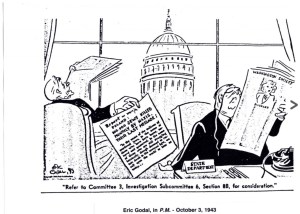Rome News Tribune, November 10, 2017
“My family is just not normal!” It’s a common lament from parishioners. My response is always, “There’s no such thing as normal.” Just because a family looks put together from the outside doesn’t mean they are “normal.” I’ve never seen a family that didn’t have rip tides and undercurrents flowing in its DNA.
My own family doesn’t fit any pattern of respectability. My mother’s father was a minister whose career was ended because of infidelity. More than one family member has struggled with drug addiction. And that’s just the tip of the iceberg. Rabbi Burton Vizotsky notes that, “when we read [in Scripture] of the dysfunctional family with strong lust and murderous intentions, we recognize that it is our family—although we may be reluctant to admit this revelation out loud.”
Biblical families from Genesis to Revelation demonstrate the brokenness of the human condition. Moses was a murderer, David was an adulterer and a murderer. Abraham and Sarah have serious marital difficulties. Eli’s sons were candidates for juvenile detention. Our Holy Book does not make any effort to cover this up.
In fact, it is through the language of family that the Bible speaks of those we call “the people of God” or the church. “I will be a father to you, and you shall be sons and daughters to me, says the Lord Almighty” (2 Cor. 6.18). “Father,” “Son,” “children,” “bride,” and “bridegroom” are commonly used terms for God’s people, all of which is the language of family.
Despite the witness of Scripture, we expend huge amounts of energy in the church trying to cover up our own imperfections in order to present a polished façade to the world.
After a brief stint living with and teaching a group of seminarians as the Nazi’s consolidated their power, Dietrich Bonhoeffer wrote about “Life Together.” He noted that for all of the closeness of study, prayer, worship, work and meals together, there was still a resistance among the individuals to admitting their own failures, their own brokenness to one another. Community, he said, could not be formed among a group of “pious” believers. The pious community can’t allow that any among them are real sinners, thus leading each to conceal their brokenness from one another. In a pious community, said Bonhoeffer, we are not allowed to be sinners. The result is overwhelming loneliness, anxiety and worry over our failures and sins.
In contrast, the grace of the gospel says, “you are a sinner, a great, unholy sinner. Now come, as the sinner that you are, to your God who loves you. For God wants you as you are, not desiring anything from you—a sacrifice, a good deed—but rather desiring you alone.”
The signals we send say, “Get your act together, then come join us in church.” What we ought to be saying is, “I am a sinner, a great, unholy sinner, loved by God. Welcome to our family.”

